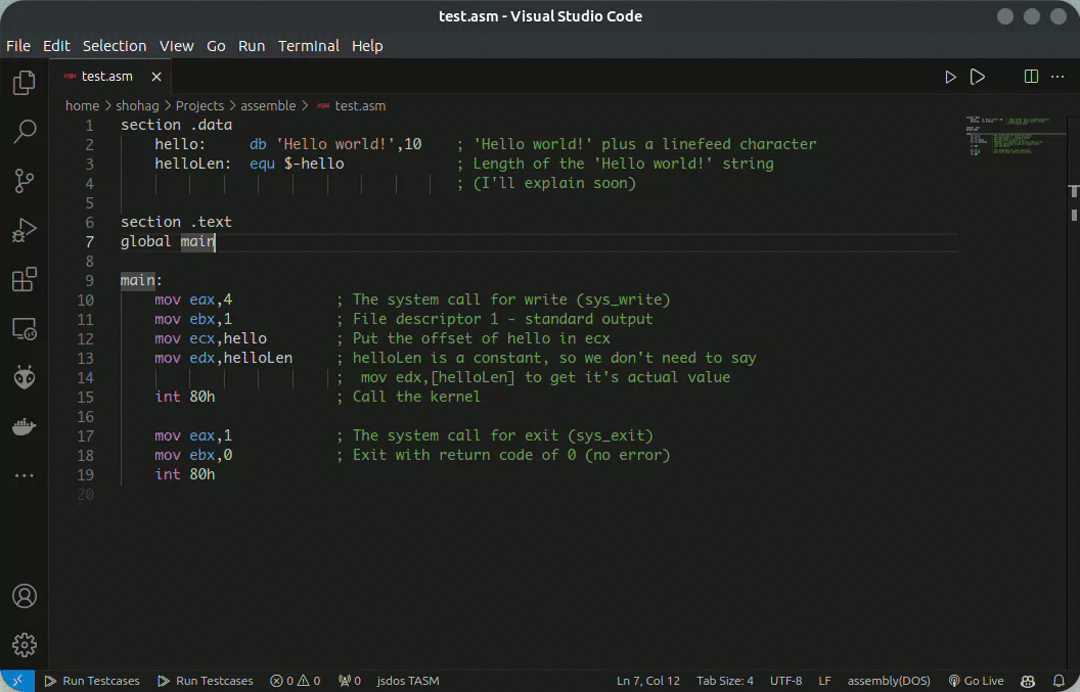Assemble and Compile Script with NASM and GCC
This simple bash script, named 'assemble,' streamlines the process of assembling and compiling assembly code for your host platform using NASM (Netwide Assembler) and GCC (GNU Compiler Collection). With 'assemble,' you can quickly turn your assembly source code into an executable binary with a 'main' section instead of '_start,' making it compatible with C-style program entry points.
:warning: These extensions currently doesn't provide proper support for Windows Machines. So, please consider before installing it.

Features
- Simplifies the process of assembling and compiling assembly code.
- Automatically detects the host platform and compiles the code accordingly.
- Generates an executable binary with a 'main' section for C-style program entry points.
Requirements
- This extension explicitly depends on Code Runner. So, you will need to be installed Code Runner extension to run assembly script.
- To ensure that the assemble script runs correctly, certain requirements must be installed globally on your system. The installation methods may vary depending on your operating system. Below, you will find some popular guides, but you may need to adapt the instructions to your specific system.
Basic Requrements
Installing NASM and GCC on Windows:
NASM (Netwide Assembler):
Download NASM from (https://www.nasm.us/pub/nasm/releasebuilds).
Run the Installer and follow the instructions.
You may need to add NASM installation binary path to the environment variable for systemwide execution. More details.
Verify the Installation:
- Open Command Prompt or PowerShell and run:
nasm --version
- It should display the installed NASM version.
GCC (GNU Compiler Collection):
Downlaod GCC from (https://gcc.gnu.org/install/binaries.html)
Run the Installer and follow the instructions.
You may need to add NASM installation binary path to the environment variable for systemwide execution. More details.
Verify the Installation:
- In the MSYS2 terminal, run:
gcc --version
- It should display the installed GCC version.
Installing NASM and GCC on Linux (e.g., Ubuntu):
Installing NASM and GCC on macOS:
NASM (Netwide Assembler):
Install NASM via Homebrew:
- If you don't have Homebrew installed, follow the instructions here.
- Run the following command in terminal to install NASM:
brew install nasm gcc
Verify the Installation:
- In Terminal, run:
nasm --version
- Again for GCC, run:
gcc --version
- It should display the installed NASM and GCC version.
Example
The 'main' section is needed because it serves as the entry point for the program when compiled and linked with GCC. When you use GCC to compile and link your code, it expects to find a 'main' function as the starting point of your program.
Here's a brief explanation of the process:
Assembly Code: You write your assembly code, including the 'main' section, which contains the code that will be executed when the program starts.
Assembling: You use NASM to assemble your assembly code into object code. This step generates a binary file containing machine code instructions.
Linking with GCC: When you link the object code with GCC, it performs several tasks, including resolving external dependencies and creating an executable binary. GCC expects a 'main' section as the program entry point.
Program Execution: When you run the resulting executable, the operating system loads it into memory and begins execution at the 'main' section, effectively starting your program.
In summary, the 'main' section is essential because it defines where program execution begins when using GCC to create an executable from assembly code. It ensures that your assembly program integrates seamlessly with the C-style program entry point expected by the compiler and the operating system.
Sample assembly code in 'hello.asm' with a 'main' section:
For Linux and Windows Platform:
section .data
hello db 'Hello, World!',0
section .text
global main
main:
mov eax, 4
mov ebx, 1
mov ecx, hello
mov edx, 13
int 0x80
mov eax, 1
int 0x80
For macOS (Due to Compiler Dependency):
global _main
extern _puts
section .text
_main:
sub rsp, 8
lea rdi, [message] ; Use this instead of 'mov rdi, message'
call _puts
add rsp, 8
ret
section .data
message:
default rel ; Add 'default rel' under label
db "Hello, world",0
Author
Abdullah AL Shohag (HackerShohag@outlook.com)
Feel free to further customize the description with your own details and any additional features or usage instructions you think are relevant.
License
Copyright (C) 2023 Abdullah AL Shohag
This program is free software: you can redistribute it and/or modify it under the terms of the GNU General Public License version 3, as published by the Free Software Foundation.
This program is distributed in the hope that it will be useful, but WITHOUT ANY WARRANTY; without even the implied warranties of MERCHANTABILITY, SATISFACTORY QUALITY, or FITNESS FOR A PARTICULAR PURPOSE. See the GNU General Public License for more details.
You should have received a copy of the GNU General Public License along with this program. If not, see http://www.gnu.org/licenses/.

